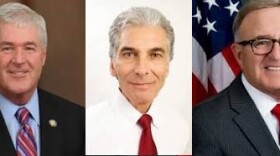As Gov. Andrew Cuomo presents his budget for the next fiscal year Tuesday, a prospective Republican challenger says legal marijuana is a key way to ease the state's fiscal crisis.
Former Erie County Executive Joel Giambra is one of the last members of a group seeking the GOP nod to run against the incumbent. Speaking to reporters Monday, Giambra says regulated and heavily taxed pot would provide cash for roads, bridges and mass transit repairs and improvements. This is an alternative to increased taxes he expects the governor to propose in his budget.
"Anywhere, from what I heard, might be a $2-$5 billion structural deficit. You are going to hear our governor talk more about raising taxes to solve problems," Giambra says. "Today, I want to talk to you about a different idea to fix some of the tremendously inadequate infrastructure we have throughout New York State, all the way from Jamestown to Montauk."
Giambra says he will have details later on how it will work and what kind of money marijuana sales to adults would bring into the state treasury, as the campaign unfolds - although he is not an official candidate yet.
"We have an idea that doesn't require raising taxes. All it does is take the courage to talk about ending prohibition of marijuana in New York State," he says. "Today, we're here to tell you that I believe it's the most effective solution to deal with the New York City metropolitan transit system and the crumbling roads and bridges we that have throughout the state."
Giambra wants New York to legalize marijuana sales to adults, heavily supervised and heavily taxed to replace what he calls the current black market of private sales of pot. He says legalization is an issue that crosses party lines and would draw bipartisan support.

In announcing his position Monday, Giambra indirectly referred to the long battles over liquor during Prohibition which led to repeal.
"What do we need more in New York State than new industry? This is going to create jobs and opportunities and, right now, the jobs and opportunities are in the underground economy, in the black market economy. That's wrong," Giambra says, "and for us to continue to perpetuate an underground economy and making pretend that it doesn't exist, I say, let's monetize it. Let's make it work for us."
At one time, Giambra did lobbying work for the marijuana industry, but says he is not getting paid for that anymore.







